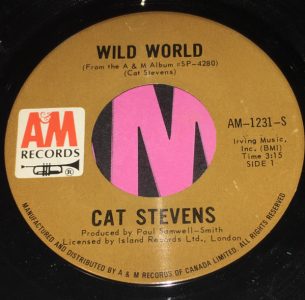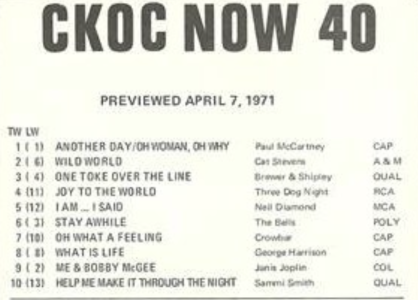#19: Wild World by Cat Stevens
City: Hamilton, ON
Radio Station: CKOC
Peak Month: April 1971
Peak Position in Hamilton ~ #2
Peak position in Vancouver ~ #3
Peak Position on Billboard Hot 100 ~ #11
YouTube: “Wild World”
Lyrics: “Wild World”
Steven Demetre Georgiou was born in 1948 in the West End of London, UK. His father was a Greek Cypriot and his mother was Swedish and they ran a restaurant. Young Steven learned the piano as a child and added mastery of guitar by the age of fifteen. After public school, in 1965 he studied for a year at Hammersmith School of Art, hoping to become a cartoonist. Concurrently, he began to perform in public billed as Steve Adams. That year he got a publishing contract and wrote “The First Cut Is The Deepest”. Georgiou hunched his name might not catch on with record buyers, so he decided on the stage name of Cat Stevens. A girlfriend had told him he had eyes like a cat, plus he thought the general public could relate to cats. In 1966, at the age of 18, Cat Stevens had a #2 single on the UK Singles chart titled “Matthew And Son”. This was followed by a song concerning workplace violence called “I’m Gonna Get Me A Gun” which also made the Top Ten in the UK. In 1967 a song he wrote, “Here Comes My Baby”, became an international hit for The Tremeloes.
Cat Stevens went on tour with the Jimi Hendrix and later with Englebert Humperdinck. In 1968 the combination of constant touring, media interviews and pop-star lifestyle resulted in a near fatal bout of tuberculosis which hospitalized Stevens for several months. Given time to reflect as he recovered from his illness, he began a process of inner reflection and meditation. This was a catalyst for a transformation in musical direction. He wrote some 40 songs and made fundamental changes to his lifestyle.
The period of 1970 to 1974 would see Cat Stevens ascend into the upper echelons of musical superstardom. His 1970 album Tea for the Tillerman, contained the single “Wild World”.

Cat Stevens wrote “Wild World”, a song about searching for peace and happiness in a crazy world. Stevens spoke about the song on The Chris Isaak Hour in 2009. He said, “I was trying to relate to my life. I was at the point where it was beginning to happen and I was myself going into the world. I’d done my career before, and I was sort of warning myself to be careful this time around, because it was happening. It was not me writing about somebody specific, although other people may have informed the song, but it was more about me. It’s talking about losing touch with home and reality – home especially.”
“Wild World” peaked at #1 in Salt Lake City, Boston, Madison (WI), and Pittsburgh, #2 in Hamilton (ON), Phoenix, Oxnard (CA), Denver, Fresno (CA), Minneapolis/St. Paul, and Dallas, #3 in Vancouver (BC), San Bernardino (CA), Santa Rosa (CA), #4 in San Diego, Harrisburg (PA), New Orleans, Cleveland, Buffalo, Cincinnati, Allentown (PA), Reading (PA), Sioux Falls (SD), and Hartford (CT), #5 in Syracuse (NY), Fort Worth (TX), Fort Lauderdale, Louisville (LY), Lexington (KY), Muncie (IN), and Cedar Rapids (IA), #6 in New Haven (CT), Reno (NV), Newport News (VA), Nashville, Saint Charles (MO), and Rochester (NY), #7 in Columbus (OH), Montreal, Austin (TX), St. Louis, and Easton (PA), #8 in Colorado Springs (CO), Los Angeles, San Jose (CA), San Antonio (TX), Monroe (LA), Portland (OR), Ann Arbor (MI), Chicago, Winnipeg (MB), and Albany (NY), #9 in Mobile (AL), Norfolk (VA), and Miami, and #10 in Salem (OR) Grand Rapids (MI), and Eugene (OR).
“Hard Headed Woman” and “Father & Son” were two more releases from Tea for the Tillerman. However, it was his 1971 album, Teaser and the Firecat, that made him an international star. The albums’ tracks included “Morning Has Broken”, “Peace Train” and “Moonshadow”. His songs of peace and unity reflected the yearnings of a new generation tired of war and racial prejudice.
His third album to garner major attention and sales in North America was Catch Bull At Four. Released in September 1972, it included a track that made its way on the pop charts on CKVN called “Angelsea”.
In 1975 Stevens had an an experience that altered the course of his life. During a swim at off the beach by Malibu, California, he was pulled out to sea by a strong current. Stevens was scared and thought he was about to die. In the midst of the trauma, Cat made a deal with God. If he lived through the ordeal and returned to shore, unharmed, he would devote his life in service to God. With the help of the oceans’ waves, Stevens did get back to shore unharmed. Prior to his episode off Malibu Beach, Stevens brother had gifted him with a copy of the Koran. In an effort to make meaning of his unfolding life and promise to devote himself to God, Cat Stevens read the Koran. That year he changed his religious path, converting from his Catholic faith to Islam. As he read the Koran, Stevens grew intrigued with the story of Jesus’ earthly father, Joseph. In 1978 Stevens took the Arabic rendering of that name as part of his new identity. He shed Cat Stevens in favor of Yusuf Islam. That same year he released his his eleventh studio album, Back to Earth. The following year, Yusuf Islam chose to leave his music career. He devoted himself to raising a family, charity and service to God.
After the attacks on the World Trade Center and the Pentagon in America on September 11, 2001, Yusuf Islam released a statement abhorring the violence and his sympathy for the victims. However, three years later Yusuf Islam was on a flight from London to Dulles Airport on September 21, 2004. As the plane was about to arrive at Dulles, there was an announcement that the flight was being diverted to Bangor, Maine. Once the plane arrived in Bangor, Yusuf Islam was taken to the FBI for questioning. He was sent back to London, UK, after learning he had been put on a no-fly list. At the airport he spoke to the press, making a statement against violence, fanaticism and war. He issued a plea for peace and unity. That fall and winter he started to perform “Peace Train” and other songs that had made him famous.
In 2003 the International World Awards Jury in Germany gave him the World Social Award for “dedicating his life to aiding the needy and the ill.” The following year Yusuf Islam was awarded the Man of Peace award by Mikhail Gorbachev who represented a committee of Nobel peace laureates for the work Yusuf had done “alleviate the suffering of thousands of children and their parents and dedicating himself to promoting peace, reconciling people and the condemnation of terrorism.”
In 2012 Yusuf Islam created a musical titled Moonshadow which debuted in Australia. On April 10, 2014, he performed at the Rock & Roll Hall of Fame induction in New York. In the fall of 2016 his Cat’s Attic tour included an itinerary of twelve concert dates across North America, beginning in Toronto and closing with two dates in Los Angeles. In September 2017 he released his fifteenth studio album, The Laughing Apple, billing himself as Yusuf/Cat Stevens.
July 19, 2024
Ray McGinnis
References:
Cat Stevens Life, Cat Stevens.com
Larry King Live,”Interview With Yusuf Islam, Formerly Cat Stevens,” CNN.com, October 7, 2004.
Shane Ryan, “Cat Stevens, Yusuf Islam and the Rock and Roll Hall of Fame,” Paste Magazine, Decatur, Georgia, October 16, 2013.

CKOC 1150-AM Hamilton (ON) Top Ten | April 7, 1971

I remember the record well. Why it did not make Toronto’s CHUM chart, remains a mystery.